We Put Bluehost vs Squarespace to the Test: Which Platform Wins in 2024?
If you click to purchase a product or service based on our independent recommendations and impartial reviews, we may receive a commission. Learn more
You have two choices when it comes to creating your website. You can either opt for a website builder like Squarespace, or you can use a web hosting provider such as Bluehost in partnership with a content management system (CMS), like WordPress.
But making this decision and comparing hosting providers isn’t easy. Squarespace and Bluehost may end in the same result – a beautifully built website – but each platform offers a very different journey to get there. So the real question is, which one is right for you?
Luckily, we’re here to help provide the answers. In this article, we’ll break down exactly what Squarespace and Bluehost offer, comparing the two to help you decide which is right for your website-building journey.
Ready to find out which one comes out on top? Read on!
Bluehost vs Squarespace: Which Is Best For You?
- Bluehost – Best for more technical hands-on control
- Squarespace – Best for an all-in-one website-building solution
Our Recommendations
| Bluehost is better for you if… | Squarespace is better for you if… |
|---|---|
| You want complete control over your hosting structure | You’re a beginner who wants to build a website quickly and easily. |
| You want to build a website with a content management system, such as WordPress | You want an all-in-one solution with all your tools under one roof. |
| You have more technical knowledge – or you’re willing to learn – to build a scalable website. | You want attractive, customizable template options that are ready to go with just a few clicks. |
Bluehost vs Squarespace: Comparison
| Bluehost | Squarespace | |
|---|---|---|
| Star Rating | 4.8/5 | 4.8/5 |
| Starting Price | $1.99 per month (billed annually over a 12-month term) | $16 per month (billed annually) – Get 10% off when you use our exclusive offer code WBE10 at checkout. |
| Ease of Use | Easy setup, but making the most of your website comes with a steeper learning curve and some technical know-how. | Easy and straightforward, Squarespace is perfect for beginners. |
| Performance and Reliability | 99.98% uptime | 99.9% uptime |
| Scalability | Lots of scalability potential thanks to a variety of hosting plans and plenty of additional plugins | Good scalability, but only within the structures of its four pricing plans – what you see is what you get. |
Ease of Use
Whether you decide to use a website builder or opt to go down the hosting route, how easy your chosen platform is to use plays a huge part in your overall building experience.
As an all-in-one website-building solution, Squarespace is designed to take the stress out of creating your site. It uses a quick questionnaire to gauge what you want your website to do and offers an AI builder as well as a selection of beautifully designed templates as a springboard. This means there’s a matter of mere minutes between sign-up and diving into your website design.
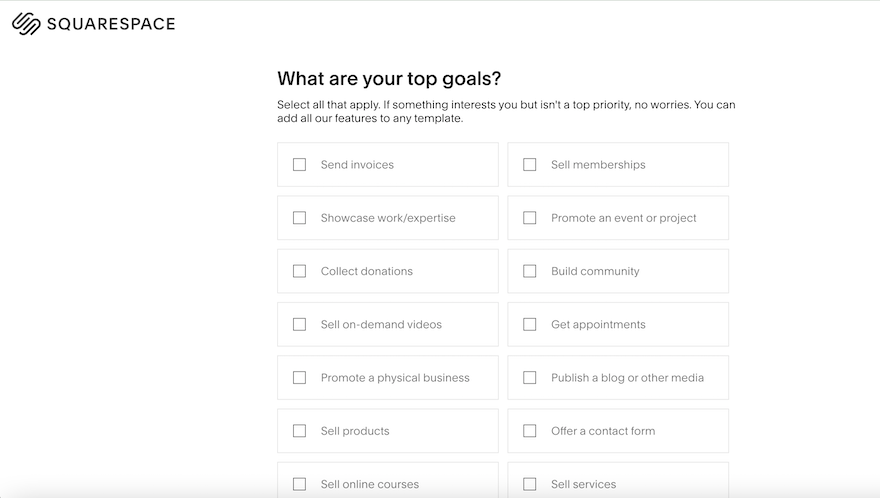
When it comes to actually putting the website together, Squarespace’s intuitive drag-and-drop builder goes a long way to making the whole process simple and straightforward. The “Edit” button in the top-left corner allows you to drag elements pretty much wherever you like, as well as change the images and text on the page.
We particularly liked how Squarespace uses grid guidelines in its editor. These are invisible until you try to move something, and then they appear in the background. This is super useful as it lets you know where the limits of your page are, preventing you from cutting anything off or disrupting the overall page design. Essentially, it helps you to keep everything ordered and clean.
Given that Squarespace used to have a reputation as the “difficult” website builder, we love to see improvements like this which show the platform’s dedication to user experience and enhanced ease of use. Nowadays, Squarespace is the easiest website builder on the market.
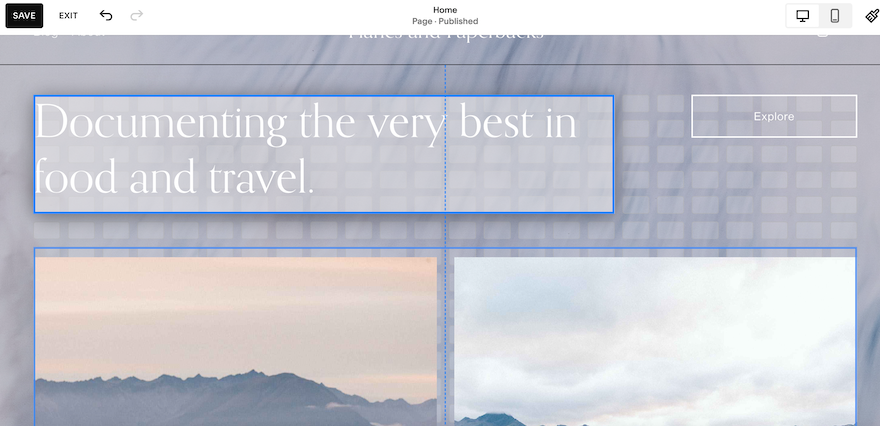
That’s largely thanks to how simple it is to add extra sections to your website, tailoring it to your needs. The premade blocks available in the editor can be added with a single click and dragged to your preferred position. And if you don’t like the element you’ve just added? You can use the mini menu box on the right-hand side to delete it.
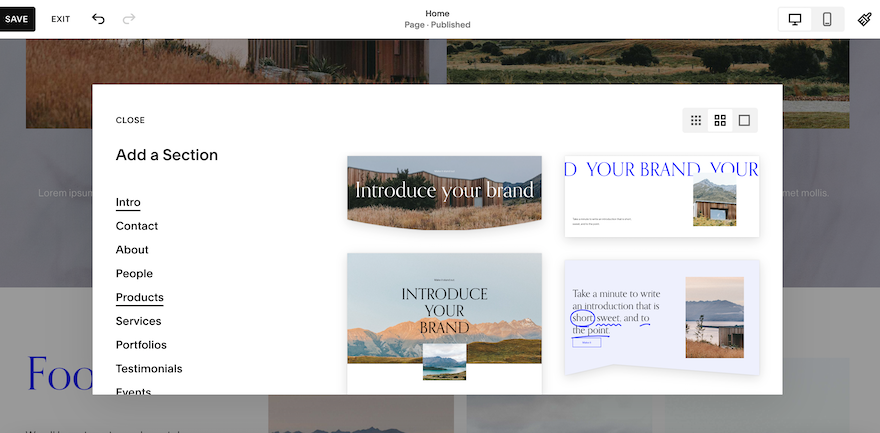
Bluehost doesn’t work in quite the same way, but that’s because it’s primarily a hosting platform, not an all-in-one website builder. Rather, it’s just one of the many components you’ll need to build a website with a content management system like WordPress.
Although there are more steps involved with Bluehost, that doesn’t mean it’s more difficult to use. In fact, this hosting provider comes with a one-click WordPress installation, which means the WordPress installation is part of the set-up process and happens automatically. How simple is that?
It also has its own version of a website builder called WonderSuite, which is designed to mimic the kind of building experience you’d get with Squarespace. To access this, after you’ve chosen your plan and answered a few of Bluehost’s introductory questions, all you need to do is select the website you want to work on from the “Websites” tab in the left-hand navigation menu, and then select “Website Builder”.

Bluehost’s WonderSuite works similarly to Squarespace in that it uses an easy drag-and-drop format along with premade blocks that are designed to help you put together a website in no time.
Interestingly, however, it’s not really powered by Bluehost – it’s powered by WordPress. So unlike Squarespace, Bluehost’s website-building experience is split over a couple of different platforms. This is definitely more confusing than Squarespace, where everything lives under one roof.
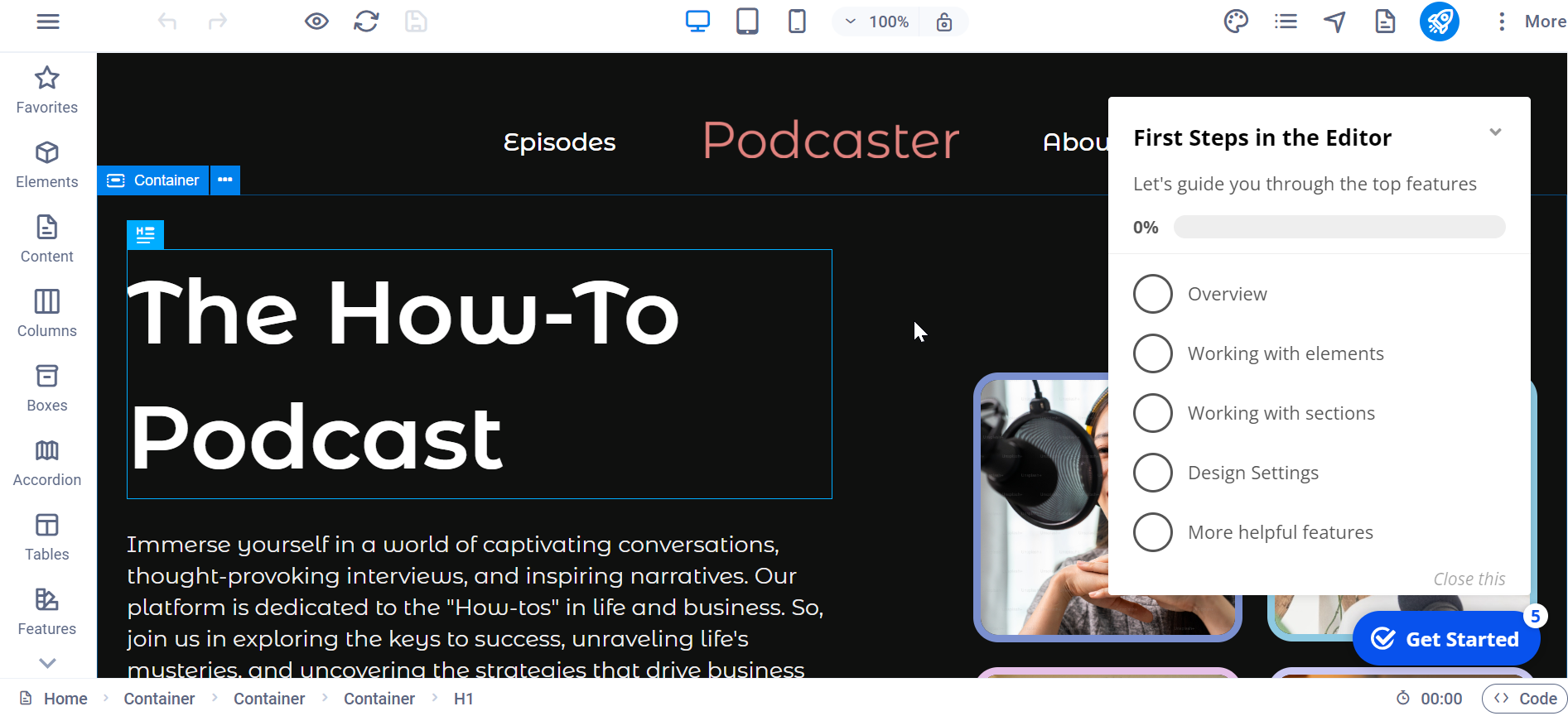
If you choose not to use the WonderSuite, you can still simplify the website-building process by integrating a page builder app like Elementor with your WordPress site. This will give you access to a section-based drag-and-drop editor, just like Squarespace.
However, for those of you who would rather go down the more traditional WordPress route, you’ll need to be a bit more tech-savvy when it comes to building your website. Some coding knowledge is an advantage and if you don’t already have that, you might have a steep learning curve to navigate.
The Winner
Ease of Use Winner: Squarespace
Cost and Value for Money
Squarespace offers four plans, with a pricing level available for everyone – no matter where you are in your business journey.
Here are the prices for each:
| Plan | Price per Month (Billed Annually) |
|---|---|
| Personal | $16 |
| Business | $23 |
| Commerce Basic | $28 |
| Commerce Advanced | $52 |
Bluehost also has four plans to choose from, however, there’s a vast difference in the price you’ll pay compared to Squarespace. For example, its most basic plan only costs $2.95 per month (when billed annually). This is substantially cheaper than Squarespace’s $16 entry plan.
However, the difference in cost is well-justified. With Bluehost, you’re only paying for the server space to host your website. Whereas with Squarespace, not only are you paying for that same server space, but you’re also paying for some advanced website-building tools and features. Plus, of course, the convenience of having everything in one place.
This means that although your Bluehost subscription fee might be low, the chances are that you’ll have to pay extra for plugins and apps that provide the same functionality as Squarespace’s many in-house tools. Some of these are free – WordPress, for example – but others will come with a cost attached, setting you back as much as $200 per month if you opt for the premium tier. And as your business scales, the more you’ll have to pay for specialized tools to support that growth.
Although the exact cost of WordPress plugins will vary from person to person, there are plenty of apps that offer free plans to help you keep your costs low each month.
Another thing to bear in mind, here, is that Bluehost’s renewal prices are different from their entry prices. This means that what you pay for your first term, won’t be the same when that term renews. Here are the prices for Bluehost’s plans, alongside the associated term length and subsequent renewal prices:
| Plan | Term Length | Price per Month (Billed Annually) | Renewal Price per Month (Billed Annually) |
|---|---|---|---|
| Basic | 12 months | $1.99 | $3.99 |
| Choice Plus | 12 months | $3.49 | $8.99 |
| Online Store | 12 months | $6.99 | $15.99 |
| Pro | 12 months | $8.99 | $19.99 |
In terms of value for money, the platform that’s going to suit you will depend upon what your site and business needs. If you’re looking for the all-in-one, hands-off-hosting experience, Squarespace’s Business plan is a good place to start. It offers more than the introductory plan, allowing users to experiment with online selling, without having to commit to the more expensive ecommerce plans.
Plus, if you use our exclusive code WBE10 at checkout, you’ll save 10% on your plan!
However, if you want total control of your website and hosting, Bluehost’s Choice Plus is our preferred option. It allows you to create up to three websites, as well as increasing your storage to 40GB. If you do want to sell online, though, we’d recommend upgrading to the Online Store plan, which allows you to take secure payments.
The Winner
Cost and Value for Money Winner: Bluehost
If you want to take a closer look at the pricing plans Squarespace offers, take a look at our in-depth Squarespace Pricing review.
Or, if you’re more interested in Bluehost, check out our Bluehost Pricing review for a closer look at what the hosting provider offers for your money.
Performance and Reliability
As they’re both such big names in the website-building game, Squarespace and Bluehost both have a good reputation for their performance and overall reliability. No website can offer a 100% uptime guarantee, but these two platforms come close.
Squarespace has a 99.90% uptime guarantee which is pretty good, but it can’t beat Bluehost’s 99.98%. This is one of the best uptime guarantees on the market and equates to just one hour and 45 minutes of downtime per year. In contrast, on average, Squarespace sees around eight hours and 41 minutes of downtime – that’s a huge difference!
When we look at page speed, Bluehost also leads the way with a load speed of between one and two seconds. Squarespace, on the other hand, can take anywhere between three and five seconds to load.
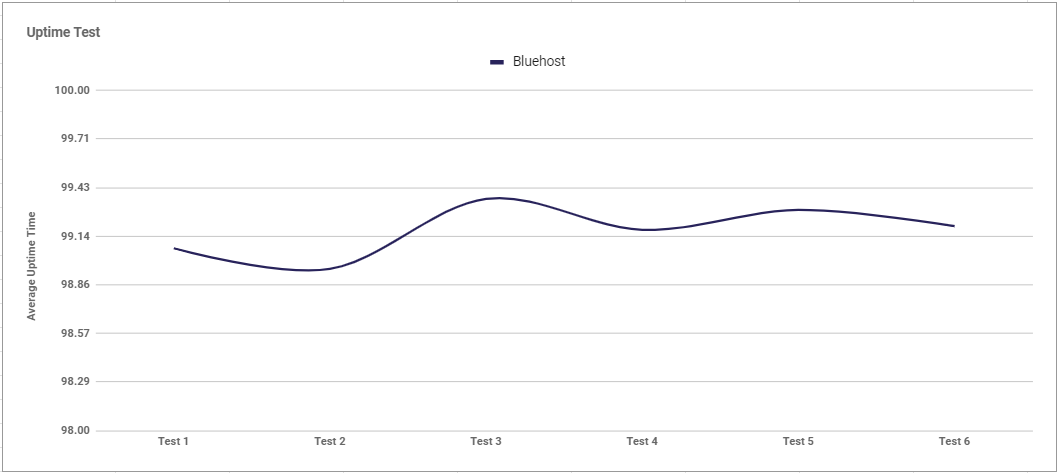
It’s worth bearing in mind that these numbers are just an average, and will be affected by several things such as how many large images you have on your webpages. However, it’s important not to neglect them, as Google measures performance and load speed as part of its Core Web Vitals. This can therefore impact your site’s overall SEO and search engine rankings.
The Winner
Performance and Reliability Winner: Bluehost
Customization and Design
When it comes to customization, Squarespace has everything you need built into its editor to help you design a website that ticks all your aesthetic boxes. Users are free to flex their creative muscles, with Squarespace allowing you to move components where you need them and change various elements like font and color scheme.
Squarespace also has a solution for those who want a more hands-off building experience – Squarespace Blueprint. This is Squarespace’s version of an AI builder which means that Squarespace will take your answers to several questions and create a ready-made website for you.

Alternatively, if you really want to make your Squarespace website totally unique, you can play around with the CSS or explore the Developer Mode which is ideal if you have some experience with coding. This isn’t necessary, though, and you can still create a stunning website with the basic customization tools that Squarespace offers.
However, it’s important to note that there is a ceiling to the level of customization you can get with a Squarespace website. Ultimately, you have to work within the parameters set by the builder’s theme structures.
This isn’t the case with Bluehost. Of course, you can’t customize anything with Bluehost on its own because it’s just the hosting provider, but in conjunction with a CMS like WordPress and third-party plugins, the customization potential is almost limitless.
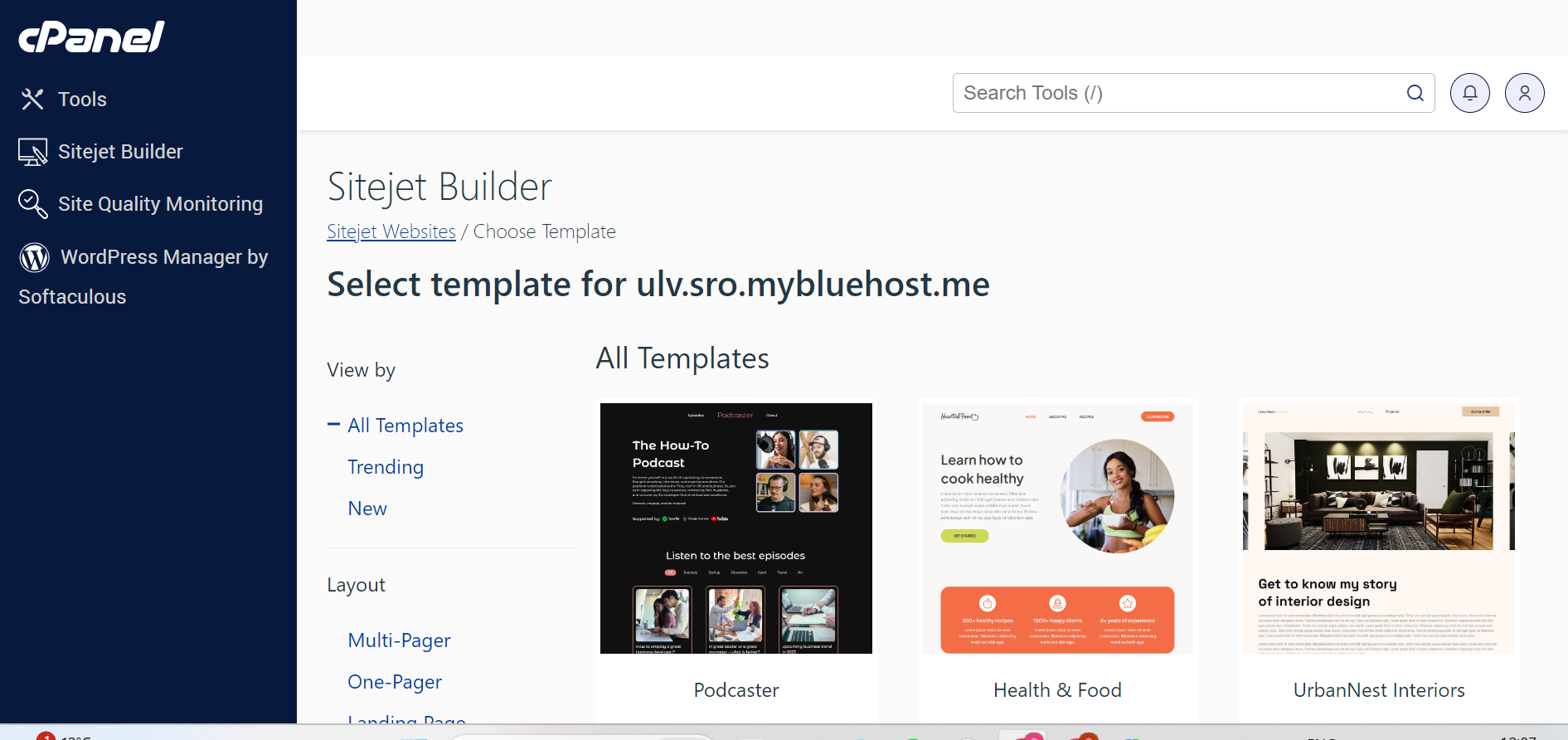
But to reach these lofty heights, you’ll need to have the technical skills to do so. WordPress also uses pre-set themes to guide your website design, and you’ll have access to the CSS and style sheets, which is where you’ll truly be able to tweak things to your liking. However, you’ll need to know code to do this, and without that knowledge, you’ll hit the same ceiling as with Squarespace.
The big difference here is that Squarespace offers a great range of website designs that are ready to go with minimal input from you. However, with Bluehost, you’ll need more technical expertise and have to work a lot harder (as well as potentially spending more money given that most WordPress themes come at an extra cost) to create the website you want.
The Winner
Customization and Design Winner: It's a Tie!
Scalability
Growth is a goal of almost any business, so choosing a platform that can support that growth is vital. So how do these two match up when it comes to scalability?
Bluehost is well-suited to support all kinds of growth because it gives users control over their hosting structure. This means that as your business grows, you can upgrade to one of its hosting packages, choosing from shared, VPS, or dedicated plans that cater for your website’s needs.
All of its plans come with 10GB of storage at the least (and up to as much as 2TB if you opt for one of the more expensive dedicated hosting plans) along with unmetered bandwidth, both of which will be crucial when dealing with increasing traffic levels.
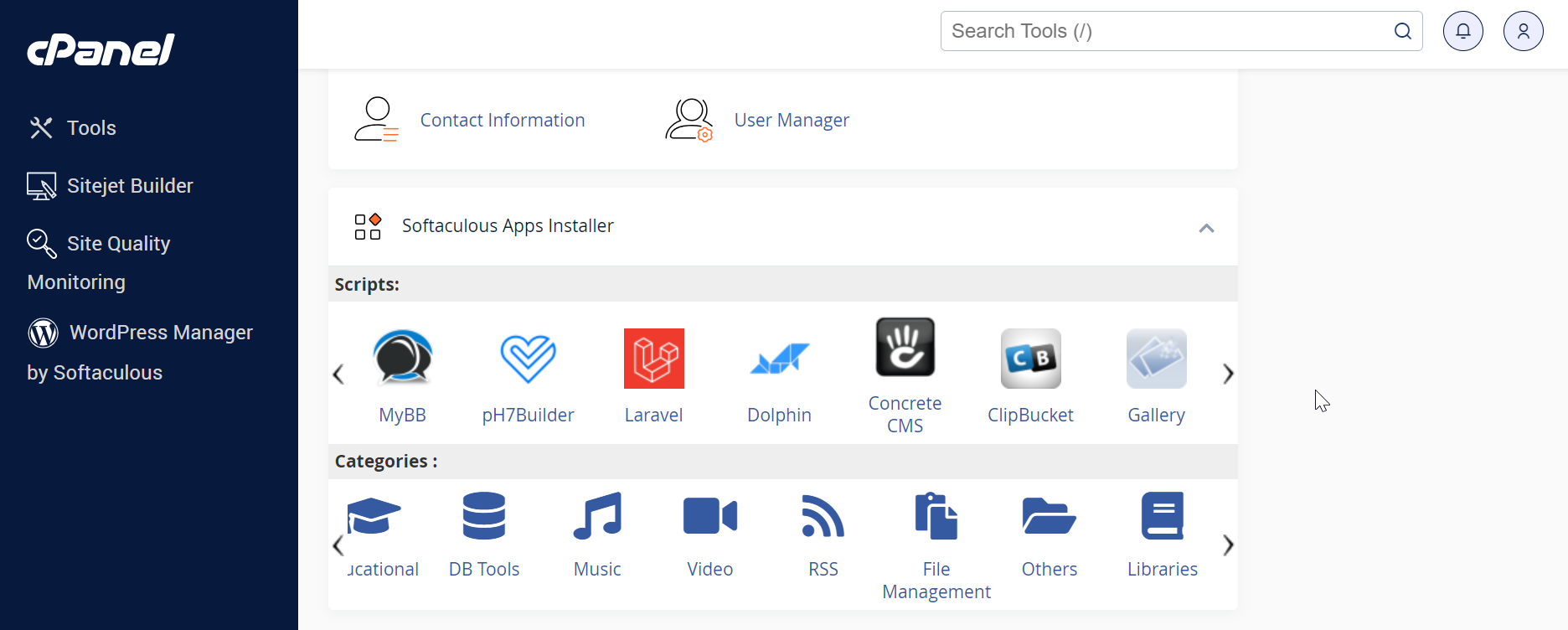
Squarespace also offers room to scale and each of its plans comes with unlimited storage and unlimited bandwidth. This gives your website a ton of power and means it won’t have any problems growing with you.
However, in terms of features, you’ll only be able to grow so far as the in-built tools available with Squarespace’s most expensive plan. This is because although Squarespace offers a limited number of carefully curated extensions, it can’t compare to the tens of thousands of plugins you can access if you use WordPress alongside Bluehost to build your website.

Because of this, you can be sure you’ll always be able to find a tool to integrate alongside your website to boost its functionality and help it grow. Unfortunately, the same can’t be said of Squarespace.
The Winner
Scalability Winner: Bluehost
Squarespace is also a good option for scalability, but you’ll be restricted by the limits of Squarespace’s offering, as it doesn’t come with as many available extras.
Customer Support
In an ideal world, there wouldn’t be any need to contact customer support, but if you do run into any issues, you want to know there’s a solid support team at your back to help you out.
Bluehost confidently ticks this box. It offers 24/7 support, and users can choose between live chat, a telephone call, or email when getting in touch. When we tested Bluehost’s live chat option, we were connected to an agent in less than a minute and they answered our queries promptly. Plus, they were super friendly, too!
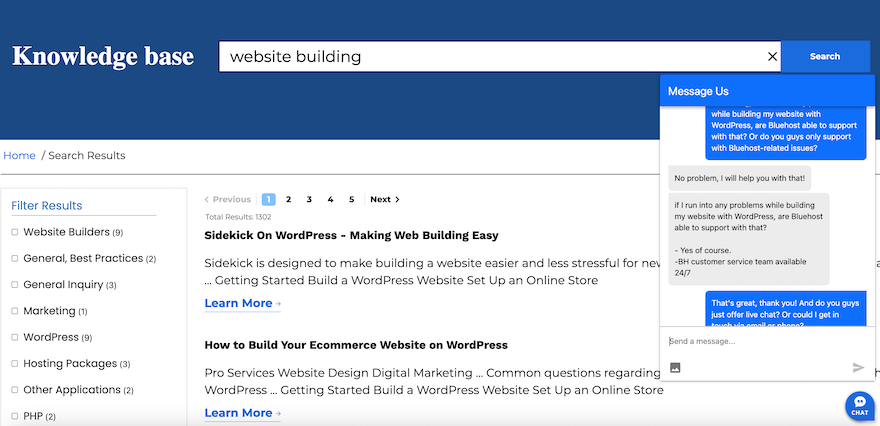
During our test, we discovered that Bluehost not only provides assistance with technical hosting issues but can also support with any WordPress troubleshooting, which is ideal given that WordPress itself doesn’t come with any in-built support structures.
However, there are limitations with Bluehost’s support, depending on which plan you’re on. Those on the Basic plan will only have access to chat support, but if you want the option to use phone support, you’ll need to opt for the Choice Plus plan or higher.
These restrictions don’t apply to Squarespace. Users receive the same level of support no matter which plan they’re on. If an issue arises, you can contact Squarespace 24/7 via email, Facebook Messenger, or X (formerly known as Twitter). In addition, Live Chat is available during the week between 4:00 AM and 8:00 PM.
When we tested the Squarespace live chat, we found that the AI bot offered several preset question options to get us started, but none of these were specific to website building and design. We then tried asking a question about changing our color palette, and the bot gave prompt instructions on how to do this. This was pretty impressive, especially because it also provided a link to a knowledge base page for further information.
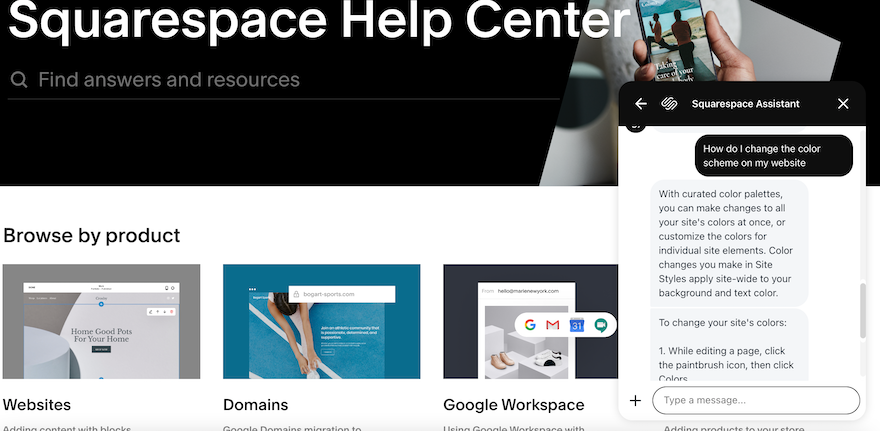
Squarespace doesn’t offer phone support because it believes “it wouldn’t be possible to provide the same effective help over the phone”. Instead, it cites online support as being faster, more accurate, and allowing Squarespace support to keep support records in one place.
In addition to the support options listed, Bluehost and Squarespace both come with extensive knowledge bases, full of useful articles to help you navigate any problems without needing to contact customer support.
The Winner
Customer Support Winner: Squarespace
How We Test Hosting Providers and Website Builders
When testing website builders and hosting providers, we use a different approach for each because we understand that they tackle the website-building process in different ways.
During our hosting research, we tested 13 hosting providers and judged them on five key categories:
- Price
- Performance
- Features
- Help and support
- Market analysis
For our website builder research, we tested over 50 builders, narrowing it down to our recommended few based on their performance in the following six main areas:
- User Experience
- Website features
- Value for money
- Design functionalities
- Help and support
- Customer score
Each provider is scored in its relevant categories, and these scores are then combined to give an overall rating out of five to decide its position in our rankings.
During this process, each platform is subject to rigorous market research, as well as hands-on user testing and evaluation, so that, across both categories, we’re able to give advice and make recommendations that are designed to help you find the best provider for your needs. We strive for honesty and accuracy so that you can leave our site armed with the information you need to make the right choice for your website.
Bluehost vs Squarespace: Summary
Both Bluehost and Squarespace are formidable players in the world of building websites, and choosing a winner out of the two is a challenge. Ultimately, the best option for you will decide on your website-building experience, alongside what you want your website to do.
Squarespace is ideal for beginners, or businesses that want an easy-to-use all-in-one solution that keeps everything under one roof. Its stunning templates and the level of customization on offer mean that even complete novices will be able to build a stunning professional website.
Bluehost, on the other hand, is a better option for those with more technical experience and who want the space to grow their site substantially. Its low-priced plans also make it an attractive option for those on a budget.
If you’d like to take a closer look at these platforms, we’d recommend reading our comprehensive reviews of each:
And once you’ve made your choice, don’t forget to come back and let us know about your experience in the comments below!


4 comments